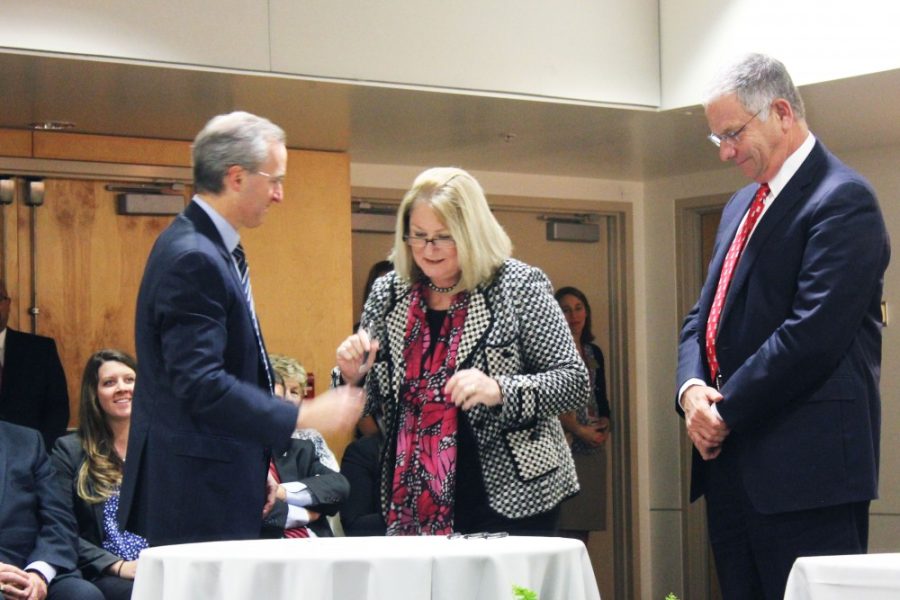Banner Health is moving forward with its plan to acquire the University of Arizona Health Network, following two votes of approval Thursday.
The Arizona Board of Regents and the UA Health Network board members voted unanimously to approve that the UA Health Network and the UA move forward with talks with Banner on the acquisition. At a press conference following the votes, UA President Ann Weaver Hart, Peter Fine, president and CEO of Banner, and Dr. Michael Waldrum, president and CEO of the UA Health Network signed a “principles of agreement” document, which will guide the acquisition.
Banner, the UA Health Network and the UA now move into an exclusive negotiation period using the principles of agreement document as the overall driving guidelines moving forward, Waldrum said.
Steven Lynn, chairman of the board of directors for the UA Health Network, said this move is the result of extensive planning and analysis by the health network.
“UA Health Network recognized that Banner is a strategic partner who would enhance and strengthen our options and operations while honoring our unique legacy and culture,” Lynn said.
The UA Health Network is separate from the UA, but operates closely with the university.
The principles of agreement lay out a plan that would create more than $1 billion of new capital and investments, Lynn said.
Banner would make significant investments into the UA Health Network, according to the principles of agreement. Banner would pay off the UA Health Network’s debt of about $146 million and create a $300 million academic enhancement fund that will pay $20 million a year to support academic endeavors at the College of Medicine – Tucson and the College of Medicine – Phoenix. A $500 million investment in capital improvement at clinical projects in Tucson would also be made by Banner within the first five years.
The UA and Banner would enter into a 30-year academic affiliation and Banner would provide financial support to the College of Medicine – Tucson and the College of Medicine – Phoenix. The UA would also be Banner’s exclusive academic medical partner in the state of Arizona with a few exceptions.
Banner would acquire the University of Arizona Medical Center, the University of Arizona Medical Center – South Campus, University Physicians Healthcare and three health plans owned by the UA Health Network. There is no anticipation of any disruption or changes to those health plans, said Keith Anderson, a partner in the Health Care Practice Group of the Drinker Biddle & Reath law firm. The operations acquired from the UA Health Network would also be co-branded by the UA and Banner.
Banner would also purchase the land around UAMC from the board of regents for $21 million and acquire the lease for the land at UAMC – South.
Employees of the UA Health Network would continue their employment for at least six months after the deal is done under the principles of agreement.
A definitive agreement for the acquisition will be completed in the next few months with a target date of September, Lynn said.
Banner, based in Phoenix, is the second largest employer in the state of Arizona and the acquisition of the UA Health Network would make Banner the largest employer in the state with more than 37,000 employees.
Waldrum said that the parties involved wanted to do this in the public eye so they could better address any concerns.
“When you have very lofty goals like we do – to become the premier academic medical center for the state of Arizona and, frankly, the leader in the country in that regard – it’s important that we take all considerations,” Waldrum said.
Valerie Hanna, student regent and a political science junior, said UA students should be proud of what this acquisition could bring and students going into the medical field stand poised to gain opportunities from it.
“For those students in particular, this is a really exciting day,” Hanna said.
Hart said she does not anticipate this acquisition would reduce tuition costs on the College of Medicine – Tucson or the College of Medicine – Phoenix.
“Tuition already covers such a tiny proportion of the total cost of medical education that what it will do is to prevent it from escalating more rapidly,” Hart said.
Hart added that this acquisition by Banner would help to draw in more physicians to Arizona through graduate medical education programs at the UA. Arizona has fewer physicians per resident than the national average, according to a 2013 report from the Association of American Medical Colleges.
Hart said the next three years with this acquisition will be the most transformational in health care in the U.S.
“I hope you can feel our commitment,” Hart said. “We are going to make the future. We are not going to recipients of a future made by others.”









